International Social Media Harm Lawsuits: Global Perspective
- Last Updated: July 14th, 2025

Attorney Jessie Paluch, founder of TruLaw, has over 25 years of experience as a personal injury and mass tort attorney, and previously worked as an international tax attorney at Deloitte. Jessie collaborates with attorneys nationwide — enabling her to share reliable, up-to-date legal information with our readers.
Legally Reviewed
This article has been written and reviewed for legal accuracy and clarity by the team of writers and legal experts at TruLawsuit Info and is as accurate as possible. This content should not be taken as legal advice from an attorney. If you would like to learn more about our owner and experienced injury lawyer, Jessie Paluch, you can do so here.
Fact-Checked
TruLawsuit Info does everything possible to make sure the information in this article is up to date and accurate. If you need specific legal advice about your case, contact our team by using the chat on the bottom of this page. This article should not be taken as advice from an attorney.
Key Takeaways:
- Social media harm lawsuits are on the rise globally, focusing on the negative mental health effects on young people and privacy concerns caused by platform design and practices.
- International lawsuits against social media giants face jurisdictional challenges and differing legal frameworks, requiring expertise in cross-border litigation and relevant regulations.
- The wave of legal scrutiny has prompted social media platforms to re-evaluate content moderation policies, increase transparency, and implement accountability measures.
Overview of International Social Media Harm Lawsuits
On this page, we’ll discuss the landscape of international social media harm lawsuits, future outlook for international social media harm lawsuits, legal challenges in pursuing international social media harm lawsuits, and much more.
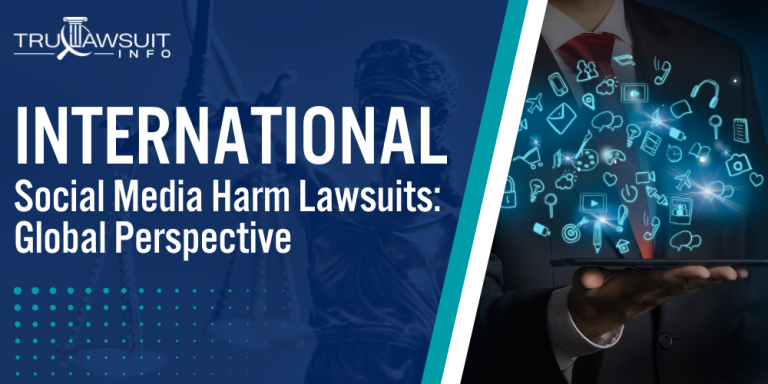
Intro to International Social Media Harm Lawsuits
Some of the key aspects of international social media harm lawsuits include, but are not limited to:
- Jurisdiction: Determining which country’s laws apply and where a lawsuit can be filed can be complex when the parties are located in different nations.
- Enforceability: Even if a judgment is obtained in one country, enforcing it against a social media company based in another country can be difficult.
- Cultural Differences: What constitutes actionable “harm” caused by social media may vary based on cultural norms and values in different parts of the world.
- International Cooperation: Successfully pursuing international social media harm lawsuits may require cooperation between legal systems and governments in multiple countries.
If you or someone you love has suffered serious harm due to social media use and the platform is based in another country, you may still have legal options.
Contact Tru Lawsuit Info using the chat on this page for an instant case evaluation to find out if you qualify to join others filing international social media harm lawsuits.
Table of Contents
Types of Social Media Harm Lawsuits
Social media harm lawsuits are increasingly seeing the inside of courtrooms around the world, primarily focusing on the negative mental health effects on young people and privacy concerns.
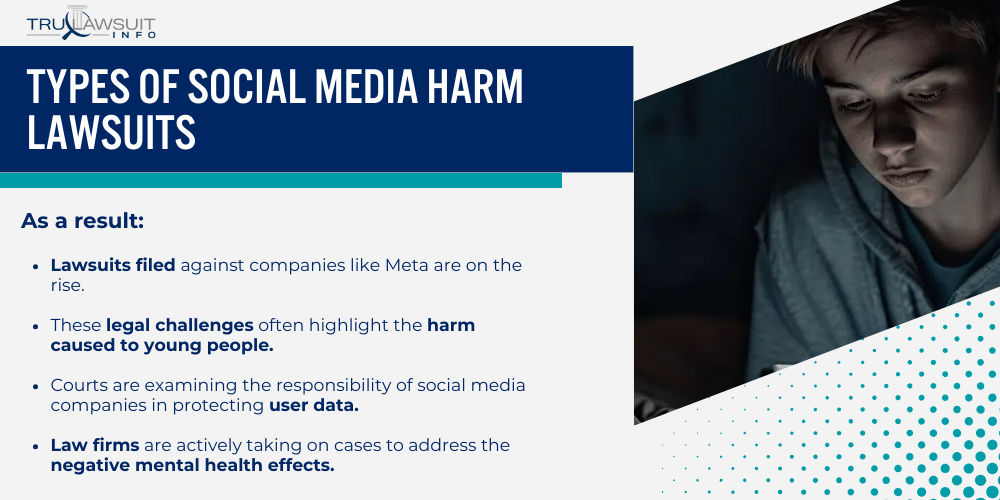
These legal actions argue that social media companies have designed their platforms in ways that contribute to a range of issues, including depression, anxiety, and, notably, eating disorders among young adults.
As a result, young people are experiencing increased rates of depression, anxiety, and self-harm.
Growing Trend of Legal Action Against Social Media Platforms
The legal landscape surrounding social media has started to surge in lawsuits.
International lawsuits are casting a spotlight on alleged social media harms.
Law firms are recognizing the profound impact social media platforms have on society, particularly among younger demographics.
As a result:
- Lawsuits filed against companies like Meta are on the rise.
- These legal challenges often highlight the harm caused to young people.
- Courts are examining the responsibility of social media companies in protecting user data.
- Law firms are actively taking on cases to address the negative mental health effects.
Defamation and Libel Cases
Defamation and libel represent significant legal battlegrounds for social media.
A single viral post has the potential to cause severe reputational damage.
Here’s how lawsuits in this domain typically unfold:
- Individuals or entities file a social media harm lawsuit alleging defamation or libel.
- Social media platforms are scrutinized for their role in publishing such content.
- The parent company often becomes embroiled in these legal tussles.
- Law firms frequently represent plaintiffs to prove the libelous nature of content shared on social media.
Privacy Violations and Data Breaches
Privacy concerns are at the heart of many social media lawsuits.
Data breaches and misuse of user data can have lasting repercussions:
- Cases involving privacy violations question the security measures implemented by social media platforms.
- Incidents of data breaches have led to users’ personal information being compromised.
- Legal challenges push for accountability and stronger protection of user data.
- Parent companies may face heavy fines and are encouraged to bolster data security protocols.
Landmark International Social Media Harm Lawsuits
This section focuses on the pivotal legal actions taken against social media platforms across different regions, setting new law precedents and presenting challenges to jurisdictional boundaries.
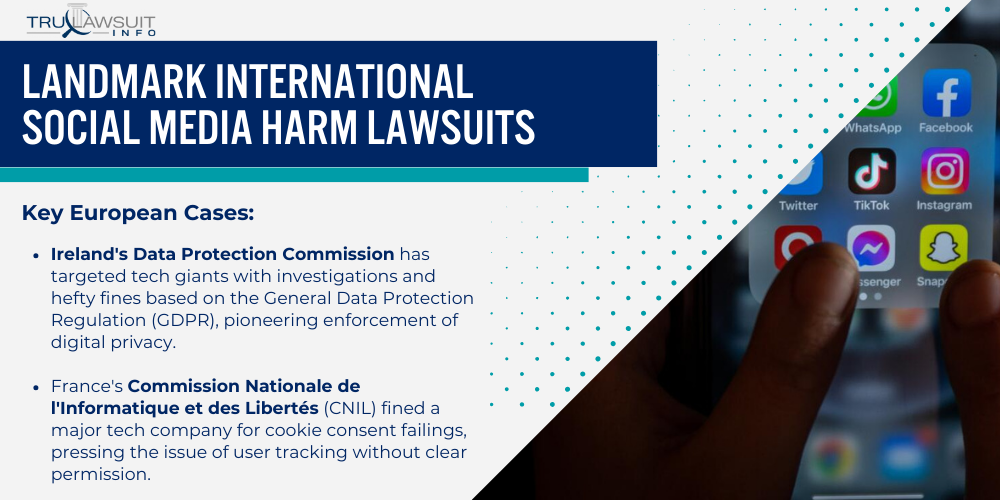
High-Profile Cases in Europe
In Europe, regulatory standards have led to significant legal challenges for social media entities.
Key European Cases:
- Ireland’s Data Protection Commission has targeted tech giants with investigations and hefty fines based on the General Data Protection Regulation (GDPR), pioneering enforcement of digital privacy.
- France’s Commission Nationale de l’Informatique et des Libertés (CNIL) fined a major tech company for cookie consent failings, pressing the issue of user tracking without clear permission.
- Germany’s Federal Cartel Office has been a frontrunner in probing the cross-use of user data across social media accounts, scrutinizing the lack of user consent in data practices.
- The UK’s Information Commissioner’s Office (ICO) continues to shape the digital landscape with investigations into the use of children’s data and its influence on young users.
Significant Lawsuits in Asia and the Pacific
Social media platform litigation extends across Asia and the Pacific, where lawsuits influence the global discourse on tech regulation and its societal implications.
Prominent Asia-Pacific Lawsuits:
- In South Korea, a lawsuit against a social media giant placed user privacy and data harvesting at the center of legal discussions.
- Australia’s eSafety Commissioner can direct social media platforms to remove harmful content, showcasing the government’s active role in content moderation.
- The Indian government has issued new regulations that require platforms to be more accountable, leading to litigation and debates over free speech versus regulation.
- Japan’s approach has been to address cyberbullying on social media, sparking dialogue on the responsibility of platforms to curb online harassment.
Legal Challenges in Pursuing International Social Media Harm Lawsuits
When initiating international social media harm lawsuits, litigants face formidable challenges linked to jurisdictional variances and disparate legal frameworks across countries.
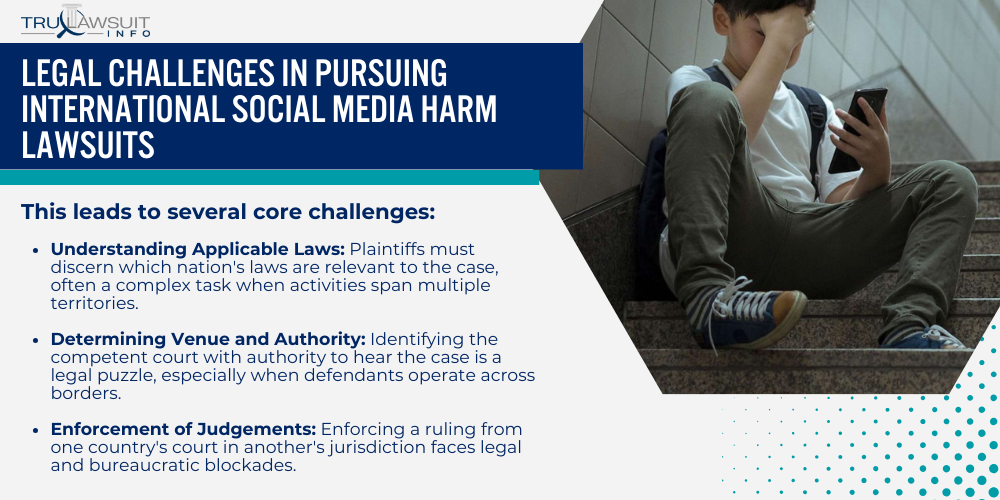
Jurisdictional Issues and Cross-Border Litigation
Jurisdiction often presents the first hurdle in international social media cases.
Litigants must determine the appropriate legal territory where the case should be pursued.
This leads to several core challenges:
- Understanding Applicable Laws: Plaintiffs must discern which nation’s laws are relevant to the case, often a complex task when activities span multiple territories.
- Determining Venue and Authority: Identifying the competent court with authority to hear the case is a legal puzzle, especially when defendants operate across borders.
- Enforcement of Judgements: Enforcing a ruling from one country’s court in another’s jurisdiction faces legal and bureaucratic blockades.
- Extradition Differences: Extradition laws, which might be necessary for compelling appearance or enforcing penalties, vary greatly and complicate cross-border legal actions.
These factors necessitate meticulous planning and expertise in international law, as they can significantly impact the feasibility and strategy of a lawsuit.
Differences in Legal Frameworks and Regulations
International social media harm lawsuits are also complicated by the variety of legal frameworks and regulations that govern digital spaces.
Some specific issues include:
- Communications Decency Act (CDA): Understanding the CDA’s role. Specifically, Section 230, which provides immunity to social media platforms from content posted by users, is critical in the context of US law.
- Data Protection and Privacy Laws: The EU’s General Data Protection Regulation (GDPR) imposes strict rules on data handling, contrasting with other nations’ regulations.
- Content Regulation Variances: Each country may have different standards for what constitutes harmful content, including hate speech and misinformation.
- Compliance Standards: Social media platforms are expected to comply with diverse standards that can vary significantly between jurisdictions.
These discrepancies necessitate that litigants are well-versed in the specific legal environments of the countries involved, ensuring their actions adhere to the relevant differences in regulations and compliance standards.
Impact of International Social Media Harm Lawsuits on Platforms
The initiation of lawsuits against social media companies has pressured these platforms to re-evaluate and amend their operational policies.
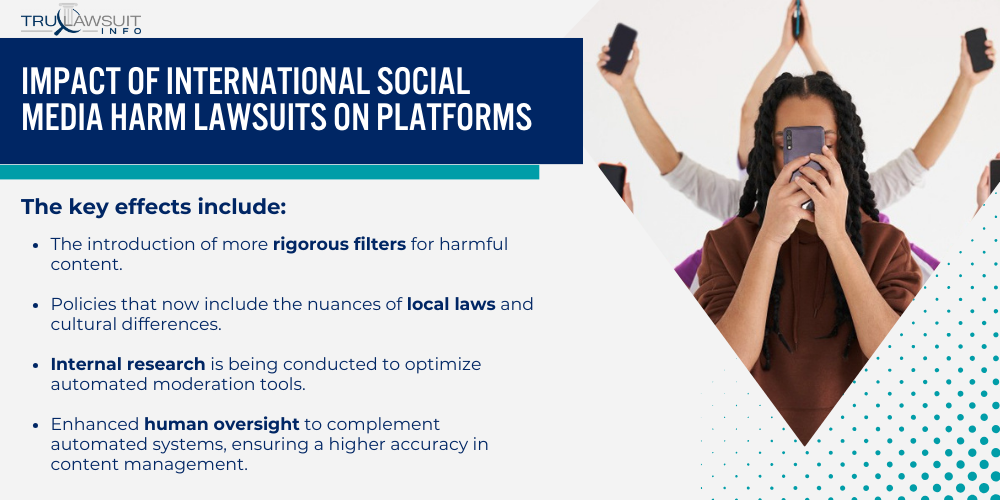
This wave of legal scrutiny has led to significant adjustments in how they govern the content and interact with users.
Changes in Content Moderation Policies
Tech companies have been prompted to reassess their content moderation policies following a series of international legal actions.
The key effects include:
- The introduction of more rigorous filters for harmful content.
- Policies that now include the nuances of local laws and cultural differences.
- Internal research is being conducted to optimize automated moderation tools.
- Enhanced human oversight to complement automated systems, ensuring a higher accuracy in content management.
Increased Transparency and Accountability Measures
International lawsuits have spotlighted the need for greater transparency and accountability.
Most social media platforms are responding with:
- Regularly published transparency reports detailing actions taken against policy violations.
- Corporate responsibility initiatives that openly address the platforms’ impacts.
- Policy changes are being communicated explicitly to users to foster an understanding of inappropriate content.
- Mechanisms for users to report concerns and receive feedback reinforce a system of checks and balances.
These shifts illustrate a growing commitment to safeguarding the digital environment while balancing the fine line between open expression and community safety.
The Role of Governments in Regulating Social Media Platforms
Government entities have recently increased their involvement in technological governance to mitigate social media harms.
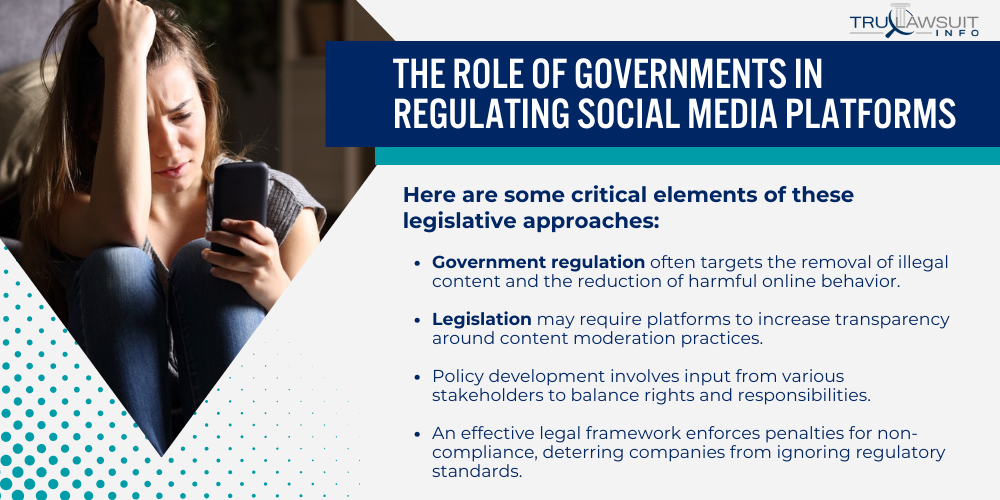
These efforts focus on establishing public policy and enforcement measures to ensure online safety and digital well-being.
The growing concern over young people’s mental health crisis has further underscored the necessity for legislative efforts to address the negative impacts of social media on young users’ mental health.
Legislative Efforts to Address Social Media Harms
Governments worldwide have initiated legislative efforts in response to the challenges posed by social media platforms’ vast influence.
The intention is to protect users while upholding fundamental rights such as freedom of expression.
Here are some critical elements of these legislative approaches:
- Government regulation often targets the removal of illegal content and the reduction of harmful online behavior.
- Legislation may require platforms to increase transparency around content moderation practices.
- Policy development involves input from various stakeholders to balance rights and responsibilities.
- An effective legal framework enforces penalties for non-compliance, deterring companies from ignoring regulatory standards.
Enforcement measures are a key aspect of these legislative actions.
They aim to ensure digital platforms adhere to the established rules, often mandating reporting obligations and regular oversight.
Collaboration Between Countries to Establish Global Standards
The transnational nature of social media platforms necessitates international collaboration and policy coordination to create consistent global standards.
Here are the key aspects of these collaborative efforts:
- International forums and organizations are platforms for countries to discuss and align their digital policies.
- Public policy officials and industry representatives can share best practices and challenges faced in different jurisdictions.
- Harmonizing regulations helps avoid conflicts of law and enables a united approach to supervision.
- Joint initiatives can lead to developing a global framework addressing the borderless dynamics of Internet governance.
Through international collaboration, governments aim to foster a cyberspace that promotes safety, respects rights and supports economic growth.
Future Outlook for International Social Media Harm Lawsuits
International social media harm lawsuits are poised to shape the digital landscape.
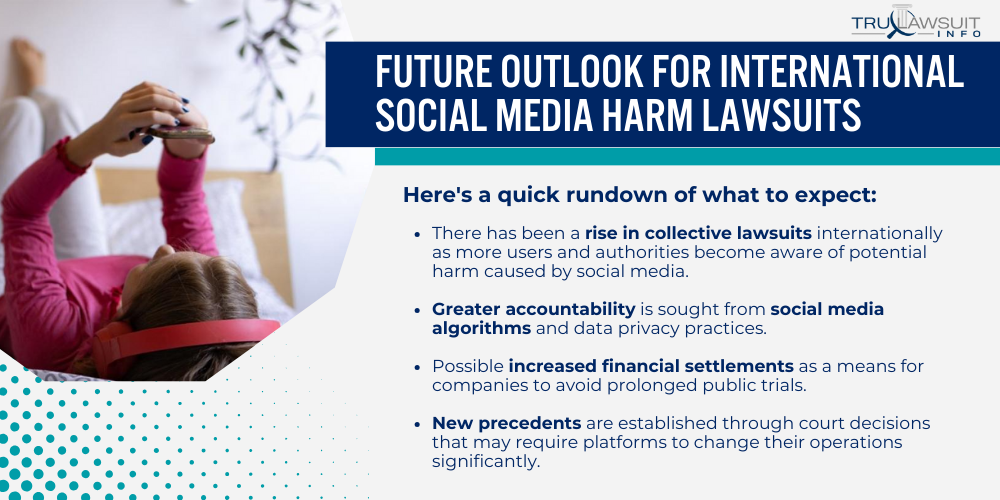
They bring the tension between user protection and free speech to the forefront, with potential litigations and settlements likely to influence future trends and anticipatory regulation.
A key issue that will continue to drive litigation against social media companies is social media addiction, highlighting its significant role in affecting mental health and user safety by linking excessive use to severe physical and emotional problems.
Potential for Increased Litigation and Settlements
Litigations against social media giants are escalating, with claims focusing on the platforms’ roles in affecting mental health and user safety.
Here’s a quick rundown of what to expect:
- There has been a rise in collective lawsuits internationally as more users and authorities become aware of potential harm caused by social media.
- Greater accountability is sought from social media algorithms and data privacy practices.
- Possible increased financial settlements as a means for companies to avoid prolonged public trials.
- New precedents are established through court decisions that may require platforms to change their operations significantly.
The landscape is also evolving legal outcomes, with companies potentially facing more stringent regulations and oversight as part of class action lawsuit settlements.
Balancing Free Speech and User Protection in the Digital Age
The battle between protecting digital rights and maintaining free speech is at the heart of these lawsuits.
Consider these developments:
- Formulating consistent regulations that safeguard free expression without allowing harm to propagate through social media channels.
- Devising robust user protection measures that do not stifle innovation and the free flow of ideas.
- The involvement of international bodies to provide guidance and frameworks that transcend national laws.
- Platforms may have to adopt more transparent content moderation policies to maintain the delicate balance between expression and safety.
The trajectory of these lawsuits will likely influence how social media companies operate and how global regulations converge to address this modern challenge.
TruLawsuit Info: #1 International Social Media Lawyer
When facing online harassment, individuals may seek legal representation from a top-ranked social media online harassment attorney.
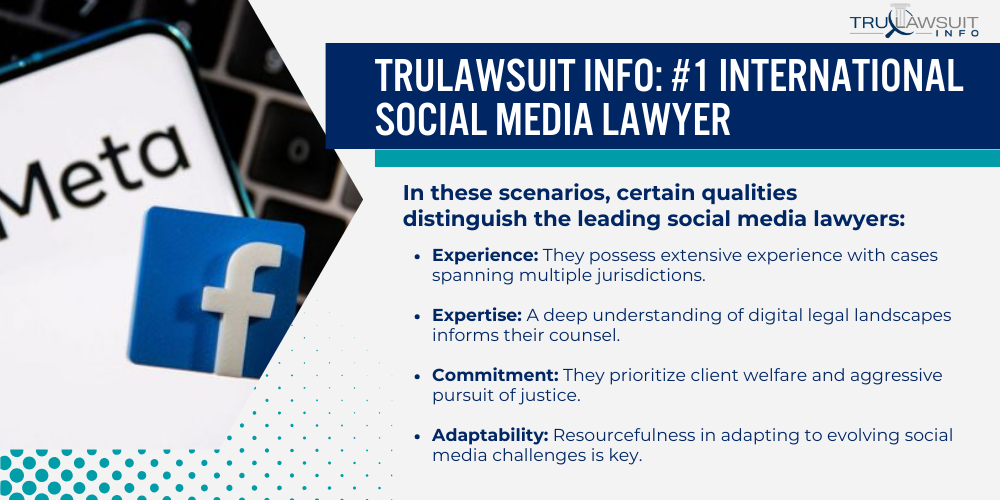
The attorney’s approach to such cases is often characterized by a precise understanding of international law, alongside a strategy tailored to client safety and perpetrator accountability.
In these scenarios, certain qualities distinguish the leading social media lawyers:
- Experience: They possess extensive experience with cases spanning multiple jurisdictions.
- Expertise: A deep understanding of digital legal landscapes informs their counsel.
- Commitment: They prioritize client welfare and aggressive pursuit of justice.
- Adaptability: Resourcefulness in adapting to evolving social media challenges is key.
Furthermore, an international social media lawyer employs robust strategies in attorney advertising to reach clients needing legal assistance.
They tend to incorporate clear messaging about their services:
- Client Testimonials: Highlighting past successes builds trust and credibility.
- Case Studies: Demonstrating expertise through detailed case analysis.
- Legal Insights: Providing educational content on social media law.
- Service Accessibility: Making legal help accessible with clear communication channels.
They represent clients with a blend of technical savvy and legal acumen, always striving to mitigate the negative effects of online harassment.
The dedication of these attorneys to safeguarding the digital interactions of individuals and companies alike is integral to maintaining legal order in the fast-paced social media environment.
Frequently Asked Questions
-
What precedents exist for social media companies being held liable for user harm?
The Supreme Court case Elonis v. U.S. is a benchmark for evaluating individuals’ accountability for potential threats expressed on social media.
In recent years, state attorneys general have led lawsuits against Meta, suggesting a trend towards stricter scrutiny and accountability for social media platforms.
-
What are the typical compensations awarded in social media harm lawsuits?
Damages awarded in social media harm lawsuits often include monetary compensation for emotional distress and rehabilitation costs.
Sometimes, courts mandate policy changes or educational campaigns led by the platforms to mitigate future harm.
-
How have class action lawsuits impacted social media platforms' policies?
Class action lawsuits have pressured platforms to alter algorithms and features, particularly those that contribute to addiction and negative mental health impacts.
They also lead to enhanced privacy settings and transparency in the platforms’ data use policies.
-
In what ways have schools taken legal action against social media platforms?
Schools have filed legal claims against social media platforms, asserting that features aimed at children and teenagers cause disruption in educational environments and contribute to mental health issues among students.
-
What legal strategies have been used in cases of social media-induced addiction?
Legal strategies in these cases focus on demonstrating that platforms crafted features that knowingly fostered addiction.
They also highlight the platforms’ failure to provide adequate usage warnings to users.
-
How do international laws differ in addressing social media platform liability?
Internationally, laws addressing social media platform liability vary greatly, with the EU enforcing stricter data privacy regulations, while some countries impose less stringent rules, focusing rather on content moderation over user harm.

Experienced Attorney & Legal SaaS CEO
With over 25 years of legal experience, Jessie is an Illinois lawyer, a CPA, and a mother of three. She spent the first decade of her career working as an international tax attorney at Deloitte.
In 2009, Jessie co-founded her own law firm with her husband – which has scaled to over 30 employees since its conception.
In 2016, Jessie founded TruLaw, which allows her to collaborate with attorneys and legal experts across the United States on a daily basis. This hypervaluable network of experts is what enables her to share reliable legal information with her readers!
Have A Case?
Here, at Tru Lawsuit Info, we’re committed to helping victims get the justice they deserve.
To do this, we actively work to connect them with attorneys who are experts in litigating cases similar to theirs.
Would you like our help?
Tru Lawsuit Info is a reliable source of information about issues that may affect your health and safety, such as faulty products, data breaches, and environmental hazards.
Our team of experienced writers collaborates with medical professionals, lawyers, and advocates to produce informative articles, guides, and other resources that raise awareness of these topics.
Our thorough research provides consumers with access to reliable information and updates on lawsuits happening around the country. We also can connect consumers with attorneys if they need assistance.
Camp Lejeune's water contamination issue spanned several decades starting in the 1950s. Exposure to these chemicals has been linked to various serious health issues, including cancer, organ diseases, and death.
Research is increasingly suggesting a link between the use of Tylenol during pregnancy and the development of neurodevelopmental disorders, such as autism and ADHD, in infants.
Legal action is being taken against manufacturers of Aqueous Film-Forming Foam (AFFF), a chemical used in fighting fires. The plaintiffs allege that exposure to the foam caused health issues such as cancer, organ damage, and birth and fertility issues.
Have A Case?
Here, at Tru Lawsuit Info, we’re committed to helping victims get the justice they deserve.
To do this, we actively work to connect them with attorneys who are experts in litigating cases similar to theirs.
Would you like our help?







